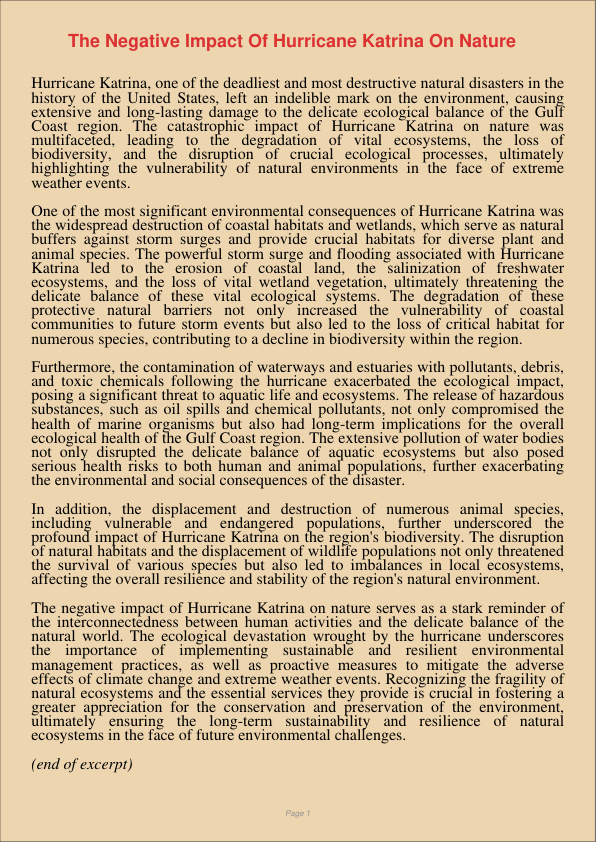The Negative Impact Of Hurricane Katrina On Nature
Jan 9, 2024
negative impact
hurricane katrina
Finance & Accounting
Management

Hurricane Katrina, one of the deadliest and most destructive natural disasters in the history of the United States, left an indelible mark on the environment, causing extensive and long-lasting damage to the delicate ecological balance of the Gulf Coast region. The catastrophic impact of Hurricane Katrina on nature was multifaceted, leading to the degradation of vital ecosystems, the loss of biodiversity, and the disruption of crucial ecological processes, ultimately highlighting the vulnerability of natural environments in the face of extreme weather events.
One of the most significant environmental consequences of Hurricane Katrina was the widespread destruction of coastal habitats and wetlands, which serve as natural buffers against storm surges and provide crucial habitats for diverse plant and animal species. The powerful storm surge and flooding associated with Hurricane Katrina led to the erosion of coastal land, the salinization of freshwater ecosystems, and the loss of vital wetland vegetation, ultimately threatening the delicate balance of these vital ecological systems. The degradation of these protective natural barriers not only increased the vulnerability of coastal communities to future storm events but also led to the loss of critical habitat for numerous species, contributing to a decline in biodiversity within the region.
Furthermore, the contamination of waterways and estuaries with pollutants, debris, and toxic chemicals following the hurricane exacerbated the ecological impact, posing a significant threat to aquatic life and ecosystems. The release of hazardous substances, such as oil spills and chemical pollutants, not only compromised the health of marine organisms but also had long-term implications for the overall ecological health of the Gulf Coast region. The extensive pollution of water bodies not only disrupted the delicate balance of aquatic ecosystems but also posed serious health risks to both human and animal populations, further exacerbating the environmental and social consequences of the disaster.
In addition, the displacement and destruction of numerous animal species, including vulnerable and endangered populations, further underscored the profound impact of Hurricane Katrina on the region’s biodiversity. The disruption of natural habitats and the displacement of wildlife populations not only threatened the survival of various species but also led to imbalances in local ecosystems, affecting the overall resilience and stability of the region’s natural environment.
The negative impact of Hurricane Katrina on nature serves as a stark reminder of the interconnectedness between human activities and the delicate balance of the natural world. The ecological devastation wrought by the hurricane underscores the importance of implementing sustainable and resilient environmental management practices, as well as proactive measures to mitigate the adverse effects of climate change and extreme weather events. Recognizing the fragility of natural ecosystems and the essential services they provide is crucial in fostering a greater appreciation for the conservation and preservation of the environment, ultimately ensuring the long-term sustainability and resilience of natural ecosystems in the face of future environmental challenges.